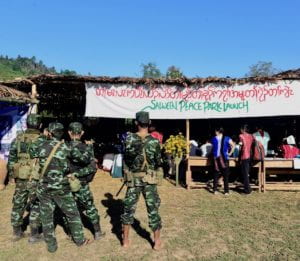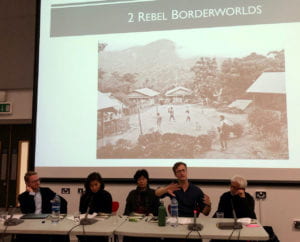
Soldiers of the Karen National Liberation Army attend the opening ceremony of the Salween Peace Park, a community-led conservation project that is conceptualised as a revolutionary alternative to state-led development in Myanmar’s war-torn borderlands (Photo: David Brenner)
Myanmar is home to the world’s longest running civil war. In the present day, more than two dozen ethnonational rebel movements are fighting for greater autonomy or secession in Myanmar’s far-flung mountains and forests bordering Thailand, China and India. At the same time, the country’s restive peripheries are being transformed by powerful economic forces. These include China’s Belt and Road Initiative, India’s Look East Policy, and the Asian Highway Network of the Asian Development Bank. These projects seek to develop large infrastructure across Myanmar’s borderlands to connect the region’s emerging markets (China, India and Mainland Southeast Asia). Their architects believe that economic development will not only increase prosperity in the region but also bring an end to decades-long conflict and violence. As roads and bridges turn peripheral battlefields into hubs of regional economic integration, revolutionary movements resisting state territorialisation seem like waning relics from a bygone era. Escalating violence in Myanmar’s borderlands, however, suggests otherwise.
To investigate the effects of economic development on ethnic conflict in Myanmar, Dr David Brenner received funding from the Global Challenges Research Fund to understand a) the ways in which infrastructure development affects ethno-national conflict; and b) how the shrinking of material space in peripheral borderlands changes practices of resistance. In December 2018 Brenner conducted fieldwork on the Salween Peace Park, a community-led conservation project located deep inside the liberated areas of Myanmar’s oldest ethno-national rebel movement: the Karen National Union/Karen National Liberation Army. Initiated and managed by community-based organisations and the Karen revolution, the Peace Park serves as a radical world-making alternative to securitised, state-led development. Importantly, the research project has developed in close cooperation with three local civil society organisations of the Kachin, Karen and Naga communities: the Kachinland Research Centre, the Karen Environmental and Social Action Network and Resource Rights for the Indigenous People. In January 2019, Brenner met with activist researchers from all three organisations for a workshop in Yangon to compare and discuss the relationship between conflict, development and resistance in the Chinese, Thai and Indian borderlands with Myanmar. In March 2019 the project partners also organised a training workshop in GPS technology to support civil society advocacy for instance by mapping land ownership of conflict-affected communities. Together with Dan Seng Lawn from Kachinland Research Centre, Brenner will present initial findings of the project at the International Convention of Asia Scholars in July 2019 in Leiden.
Dr David Brenner is Lecturer in International Relations at Goldsmiths’ Department of Politics and International Relations. His first book Rebel Politics: A Political Sociology of Armed Struggle in Myanmar’s Borderlands is forthcoming with Cornell University Press in October 2019. You can follow his research on Twitter @DavBrenner.

